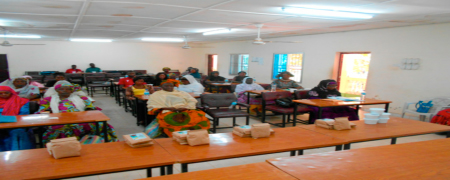
At least 20 food processors drawn from
various enterprises and private businesses recently concluded a five-day
refresher training course on formulating complementary foods.
The course was organised by the food
technology service under the department of Agriculture, and funded by P2RS
Project NEMA, Abuko.
Speaking at the end of the training course
held at the WellIingara Model Horticulture Centre, Seedy Fofana, head of the
Food Technology Services department of Agriculture and also a food scientist,
said the training course was meant for local food processors and local
entrepreneurs, who are dealing with food processing in the country.
It focused in formulating complementary
foods, as the bulky of the raw materials come from cereals and legumes.
Funded by Nema, the project seeks to address
the issues of complementary food, quality and safety food.
He said during the five-day training
session topics covered included complementary food guidelines, which is very
important and they deemed it fitting to cover that area.
Food quality and safety was also covered,
as well as raw materials, packaging and hygiene, he said, adding that they do
not compromise with food hygiene.
According to Mr Fofana, some of them
attended a series on this nature of training, but still need refresher
training.
Most of them are engaged in this type of
business; that was why it was easy for some of them to capture most of the
topics treated.
Mr Fofana also dilated on the significance
attached to the training course, which would greatly improve their knowledge in
their daily business.
One of their objectives is always to
improve the capacity of the food processors to better manage themselves and
their businesses at their level.
Mr Fofana also described the training
course as very interactive, educative and important, as it was a participatory
forum.
The forum was an open discussion, but not
an academic lecture, and he urged them to take the opportunity to clear their
doubts.
The objective is to eradicate malnutrition
among infants and use the locally produced foods which do not cost anything.
The raw materials are locally made and
available in the country, he continued, adding that most of them have milling
machines, but some of them need processing equipment to operate in their
business.
Ebrima Bah, the GHE participant, said they
need more of this training course in the future, adding that the topics covered
how to make baby foods in different products.


